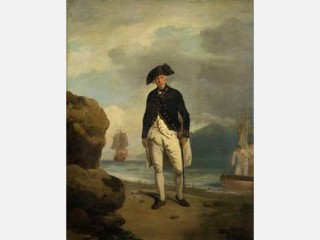
Arthur Phillip biography
Date of birth : 1738-10-11
Date of death : 1814-08-31
Birthplace : London, England
Nationality : British
Category : Famous Figures
Last modified : 2010-12-22
Credited as : Naval officer, ,
Arthur Phillip was an English naval officer and the first governor of New South Wales. His views of predominantly free settlers foreshadowed the sentiments of the later emancipists.
Arthur Phillip was born on Oct. 11, 1738, in London and attended the Greenwich school for seamen's sons before serving an apprenticeship in the merchant navy. During the Seven Years War (1756-1763) he transferred to the Royal Navy and rose to the rank of lieutenant. Subsequently he retired on half pay, becoming a farmer in Hampshire. In 1774 the Admiralty allowed Phillip to serve as a captain in the Portuguese navy, and he later rejoined the Royal Navy during the American War of Independence. At 48 Capt. Phillip was offered a position as governor of a penal colony about to be established at Botany Bay, Australia.
The 11 ships of the 1st Fleet reached Botany Bay in January 1788 after a voyage of 8 months. As the site for a permanent settlement Phillip chose Sydney Cove inside a great natural harbor a few miles north of Botany Bay. Three-quarters of the 1, 030 persons who disembarked there were convicts, the remainder marines and officials.
For 5 years Phillip, with unflinching optimism, struggled to create a viable colony with unsuitable human material. Convicts, mostly lower-class criminals from Britain's burgeoning towns, were granted small farms on the expiry of their sentences, but this did not transform them into an industrious peasantry. The marines, who initially received no land, were dissatisfied because they could not advance their personal fortunes in such a remote outpost. Only 13 free settlers of the kind that Phillip wanted in order to create a thriving colony arrived during his term as governor.
Starvation was a constant threat. The 1st Fleet carried sufficient provisions for only 2 years; the 2d Fleet did not reach Sydney until June 1790, and the 3d Fleet in July 1791. Until supplies arrived, the inhabitants were allocated rations insufficient for a day's hard work, and stocks of clothing were exhausted. Parramatta, a township 15 miles upstream, became the center for colonial agriculture because of its fertile soil. Although convict labor was employed on government farms, the lack of draft animals and implements, and the problems associated with a new environment, impeded agricultural progress.
When Phillip returned to England in December 1792 owing to illness, the small settlement of 3, 000 people could not produce its food requirements. But the New South Wales Corps, which replaced the disgruntled marines in 1791, was fostering trade with merchants from India and the United States, and the arrival of more ships ensured the colony's physical survival. Because of its cost to the British taxpayer, however, the settlement's long-term future remained in doubt.
Although Phillip's vision of a colony with predominantly free settlers was not immediately realized, he did succeed in piloting the settlement through its early years of deprivation, and before he left, the outlines of a solution to the colony's economic problem were discernible. But the extensive powers vested in the governor encouraged autocratic rule and led to future conflicts.
After returning to England, Phillip resumed his naval career and became a rear admiral in 1798. In 1805 he retired to Bath, where he died on Aug. 31, 1814, shortly after becoming an admiral of the blue.
Two major biographies of Phillip are George Mackaness, Admiral Arthur Phillip, Founder of New South Wales, 1738-1814 (1937), a long, detailed, and generally sympathetic account; and a more penetrating study of the settlement's early years by M. Barnard Eldershaw, Phillip of Australia: An Account of the Settlement at Sydney Cove 1788-1792 (1938).



















